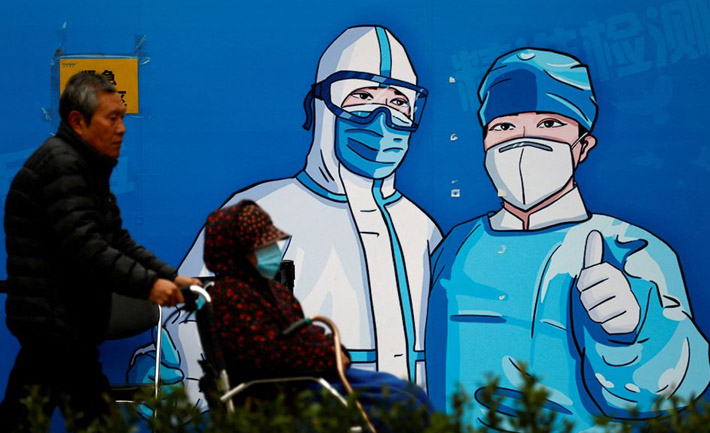Beijing closed parks and museums on Tuesday and Shanghai tightened entry rules to the city as China’s authorities struggle to keep a lid on a surge in Covid-19 cases.
China reported 28,127 new locally transmitted infections on Monday, close to its daily peak since April, with infections in the southern city of Guangzhou and the southwestern municipality of Chongqing making up about half of the total.
In Beijing, cases are reaching new highs every day, prompting the city government to call for more residents to stay put and show evidence of a negative Covid test, no more than 48 hours old, to enter public buildings.
Also on AF: JD.com Cuts Exec Salaries Under ‘Common Prosperity’ Pressure
Late Tuesday, financial hub Shanghai announced that from Thursday people may not enter places such as malls and restaurants within five days of arriving in the city, although they can still go to offices and use transportation.
Earlier, the city of 25 million people ordered the closure of cultural and entertainment venues in seven of its 16 districts after 48 new local infections were reported.
The wave of infections is testing China’s recent adjustments to its Covid-free policy, which aims to force authorities to be more targeted with their crackdowns.
Beijing had hoped to steer them away from the blanket lockdowns and testing that have stifled the economy and demoralised the population after nearly three years into the pandemic.
Even with the amended guidelines, China remains out of sync with the rest of the world with its stringent coronavirus restrictions, including borders that remain completely closed.
Tightening measures in Beijing and elsewhere, even as China tries to avoid citywide lockdowns like the one that crippled Shanghai this year, has renewed investor concerns about the world’s second-biggest economy, weighing on stocks and prompting analysts to cut their forecasts for the Chinese year.
China Facing Slowest Growth in Decades
Brokerage firm Nomura said its internal index estimated that localities accounting for about 19.9% of China’s gross domestic product were under some form of lockdown or restrictions, up from 15.6% last Monday and not far from the index’s peak in April, during Shanghai’s lockdown.
The government argues that President Xi Jinping’s ‘zero-Covid’ policy saves lives and is necessary to prevent the healthcare system from being overwhelmed.
China’s economy is facing one of the slowest growth rates in decades: a giant property bubble has burst, youth unemployment recently reached record levels, the private sector has been crippled by its coronavirus policy and a there have been series of regulatory crackdowns on its tech and property sectors.
Investors had hoped that China’s more targeted enforcement of Covid restrictions would lead to more significant easing, but many analysts caution against being too optimistic.
Experts warn that a full reopening would require a major effort to boost vaccination and a change in messaging in a country where the disease remains widely feared.
Authorities say they plan to build more hospitals and fever clinics to screen patients, and are formulating a vaccination drive.
“The real picture may not be as rosy as it seems,” Nomura analysts wrote, saying they only expect any reopening to accelerate after March next year, when the reshuffle of China’s top leadership is complete.
- Reuters with additional editing by Sean O’Meara
Read more:
Beijing, Guangzhou Baton Down as Covid Flare-ups Spread
Guangzhou Plans 250,000 Quarantine Beds as Covid Spreads
China Markets Jump After Politburo Eases Covid Rules
























